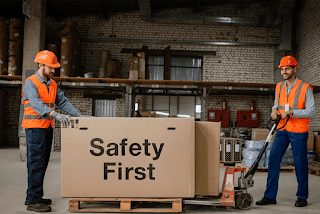Freight security in the modern world: Protecting cargo and reducing risks
In the vast web of global logistics, the security of freight is an increasingly crucial concern. With goods traversing vast distances and passing through multiple hands, the importance of cargo security cannot be overstated. Safeguarding shipments is not merely a matter of protecting assets; it is also about ensuring the integrity of the supply chain and minimizing risks that could have far-reaching consequences.
The global supply chain is a complex and interconnected network that facilitates the movement of goods from manufacturers to end consumers. In this dance of trade, cargo is the lifeblood that sustains economies and businesses. Ensuring the security of this cargo is paramount, as any disruption or loss can have a domino effect, impacting not only individual companies but entire industries and economies.
Cargo security is not only about preventing theft; it encompasses a broader spectrum of risks. These include tampering, damage, and even terrorism. In an era where the movement of goods is more globalized than ever, the vulnerability of shipments to various threats necessitates a comprehensive approach to freight security.
The protection of cargo begins long before it reaches its final destination. Implementing robust security measures at every stage of the supply chain is crucial to safeguarding shipments from potential threats. Here are some key measures employed in the modern logistics landscape:
- Strategic planning and risk assessment: Before a shipment embarks on its journey, thorough risk assessments must be conducted. This involves identifying potential vulnerabilities and devising strategies to mitigate them. Understanding the specific risks associated with different routes, modes of transportation, and handling processes is fundamental to effective cargo security.
- Personnel training and awareness: Human error remains a significant factor in cargo security incidents. Training personnel at every touchpoint of the supply chain to recognize and respond to security threats is essential. This includes educating workers on the importance of following established protocols, conducting regular security drills, and fostering a culture of vigilance.
- Advanced tracking systems: Utilizing state-of-the-art tracking systems is instrumental in keeping a close eye on shipments in real-time. Advanced technologies, such as GPS tracking and RFID (Radio-Frequency Identification) tags, provide accurate and up-to-the-minute information about the location and status of cargo. This not only aids in preventing theft but also allows for immediate response in the event of any irregularities.
- Secure packaging and seals: Tampering is a persistent concern in the world of freight. Implementing secure packaging and tamper-evident seals adds an extra layer of protection to cargo. These measures not only deter potential thieves but also provide a visible indicator of any unauthorized access.
As technology continues to advance, the logistics industry is increasingly turning to innovative solutions to enhance cargo security. Some cutting-edge technologies making waves in the realm of freight security are:
- Blockchain: Known for its secure and transparent nature, is being embraced in logistics to create an immutable record of every transaction and movement within the supply chain. This not only reduces the risk of fraud but also enhances traceability and accountability.
- Artificial Intelligence (AI) and Machine Learning: AI and machine learning algorithms are being employed to analyze vast amounts of data to identify patterns and anomalies that may indicate potential security threats. These technologies can enhance predictive analytics, helping logistics companies stay one step ahead of potential risks.
- Biometric security: Biometric authentication, such as fingerprint or retina scans, is being integrated into access control systems for warehouses and transportation hubs. This ensures that only authorized personnel have access to sensitive areas, reducing the risk of internal security breaches.
- Drones and autonomous vehicles: Drones and autonomous vehicles are revolutionizing the transportation of goods. With the ability to operate 24/7 and follow predetermined routes, these technologies not only improve efficiency but also reduce the risk of human-related security lapses.
The landscape of freight security is evolving to meet the challenges of the modern world. The importance of securing cargo goes beyond protecting assets; it is about safeguarding the integrity of the supply chain and maintaining the trust of consumers and businesses alike.






Comments
Post a Comment